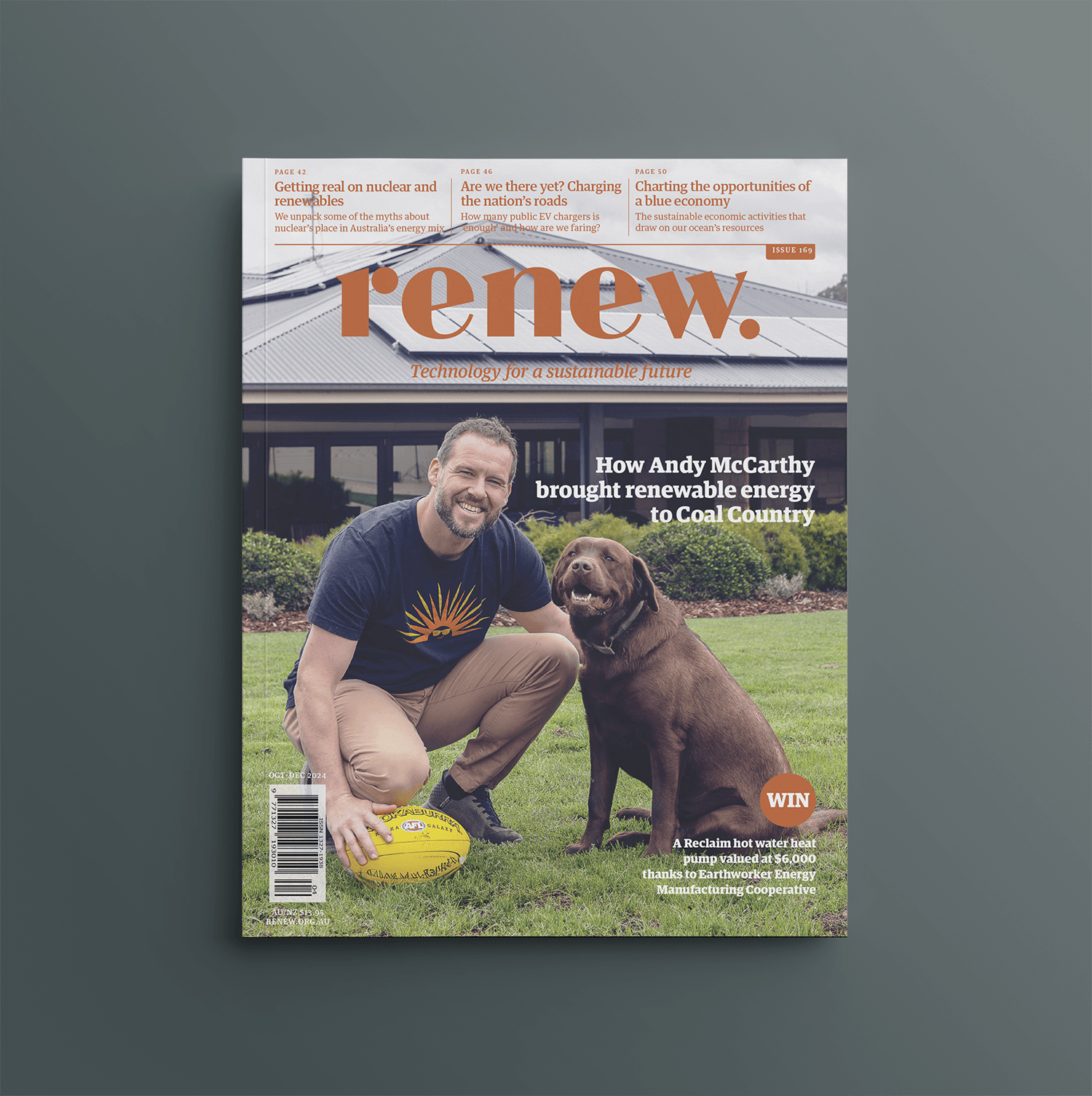Energy forecasts, hydrogen hype and questions of progress

Alan Pears gives us his round-up of the main energy issues this quarter.
The realities of driving energy change
I recently attended a very interesting discussion with a diverse group of leading green energy people.
Most of them seem resigned to delays in the rollout of green energy due to bureaucracy, politics, and failure of green energy businesses to build social licence to operate. Their underlying perspective was positive, but change is proving to be difficult. Nevertheless, governments and businesses are finding ways to streamline action and overcome barriers.
Most of the discussion was on the supply side. I raised the issue that people don’t actually want energy: they want services they value that are reliable, affordable and sustainable.
There was strong consensus that we need to better utilise existing assets on both supply and demand sides.
Discussion focused on delays in construction of powerlines, a big problem. Some innovative solutions were discussed.
Installing multiple power lines and new technology cables on existing transmission towers could help. Smart strategies can increase utilisation by using batteries to store electricity delivered during times of low demand and dynamic management of peak capacity when winds cool powerlines and allow higher electricity flows. We even discussed use of ‘battery trains’ and big batteries on trucks, as I flagged in a recent article.
The importance of ‘licence to operate’ was discussed. This must come through long term strategies to build trust and treat communities affected by new powerlines fairly. It is important not to cave in to loud opponents driven by political agendas or desire to extract unreasonably large amounts of money from desperate renewable energy developers.
The underlying message for a sustainable energy future was optimism, but slower than many would like to see. We can’t afford to delay, so we have to find and implement solutions, fast.
How seriously should we take mainstream energy forecasts?
When I became involved in energy issues, mainstream visions of our energy future were focused on enormous growth in energy demand. The 1981 Victorian government view was that 23 new coal power stations would be built by 2030. We’ve built one. The Western Australian government thought it would need to build a new nuclear power station every two years or so from the 1990s. They have built none.
I am confident that today’s mainstream energy forecasts will also prove to be wildly wrong, despite the impression given of detailed analysis by experts. Often, increased understanding and awareness of an emerging problem or opportunity drives change in unexpected ways.
No-one wants energy for its own sake. Demand for energy is derived from consumers’ perceptions about how much energy they need and when, to provide the services they think they need or want. Their perceptions are based on their past experience and their limited understanding of the laws of physics and chemistry, their limited numeracy and the powerful influence of advertising funded by powerful incumbents.
Most energy forecasting is based on incremental change in technologies, ‘moderate’ adoption rates and ‘rational’ economics using simplistic theory based on assumptions of modest rates of evolution in cost-efficiency of retrofitting, innovation, economies of scale and ‘learning by doing’. It also assumes that decisions will focus on ‘least energy cost’ when most consumer decisions place little or no emphasis on energy costs, and most consumers pay retail energy prices, not wholesale prices. There can be many surprises. For example, one MP commented at a public forum that, after shifting from gas, including ducted heating, electricity bills didn’t increase much. Maybe the gas ducted heating fan used a lot of electricity.
We live in a time of astounding and often disruptive change. We are learning a lot, and this is driving innovation in products and services, business models, policies and program design.

The Hydrogen hype unravels
Hydrogen will play an important role in our zero carbon energy future, as well as for feedstocks and food production.
However, it has been obvious for a long time that liquefying hydrogen for exports and distributing compressed hydrogen in pipes to homes, where leakage would be very likely, made no sense. Our ability to use hydrogen for grand ‘superpower’ visions, though feasible, faces strong competition. Other countries are prepared to offer even bigger subsidies than we can to capture investment in resource production and large scale energy intensive manufacturing. They have very deep pockets and powerful political needs to dominate global economic activity, at any expense. Powerful players distort policies and investment decisions.
So it is not surprising to see many proposals related to hydrogen falling over. It seems to be yet another example of Australia’s cultural problem: the ‘silver bullet’ syndrome. Ignorant politicians and aggressive financial consultants get excited by marketing hype that claims it will solve our climate, economic and employment problems, based on unrealistic assumptions that are not questioned. Ignorant Australians, many of whom are not very numerate or understand the laws of physics and chemistry, are bombarded by media stories. So we waste money, time, political capital and emotional energy.
Rebound effects or flow-on effects?
We are seeing a re-emergence of the argument that energy efficiency improvements will be offset by the rebound effect, often described as the Jevons paradox. This suggests that rebound effects often offset savings from energy efficiency because people improve comfort or spend the savings on other things that use energy.
I thought we had moved beyond this simplistic way of thinking about energy efficiency. I explained its flaws in an article in Renew 134, On the rebound: Countering the sceptics. Obviously not enough economists, policy makers or energy analysts read Renew.
It is certainly common for people experiencing energy poverty or poor service quality to take some or all of an energy efficiency improvement to improve comfort or service quality, rather than reduce energy consumption. But that change offers value, so it is not an argument against the value of energy efficiency, especially if the value of the ‘multiple benefits’ such as improved health, reduced absence for work and reduced healthcare costs are considered.
I also find that limited understanding of complex systems misleads. For example, if you insulate the ceiling, temperatures near external walls and windows increase, increasing energy waste through them. Upgrading the wall insulation and windows would increase savings.
Most decisions that affect energy use involve little or no consideration of energy consumption. They are driven by the profit motive, or desire for services that consumers perceive to be essential or valuable. Energy outcomes are almost always accidental consequences. We need well-designed policies, education, advertising and strong financial incentives to shift priorities.
Business decisionmakers and households are making ‘bounded’ rational decisions based on their perceptions and experience, influenced by enormous advertising budgets and persuasive sales people. This is leading to incredible financial waste, environmental impacts, discomfort and worse health.
We are making progress, but it is far too slow, and is undermined by influential people who have been misled by the superficial ‘logic’ of the Jevons paradox.
It’s really important to futureproof all new purchases and investments
Choices we make today can become future problems, not solutions.
Urgent emission reduction is crucial: for example, a tonne of CO2 released today will continue to heat the planet for more than a hundred years. Methane leaks have a big impact over a decade or two.
Some actions, such as weak fuel efficiency standards, can cut emissions to some extent, but lock in higher vehicle lifetime emissions compared with measures that reduce car and truck use or shift travel to electricity with emission intensity declining towards zero.
The embodied energy, resources and emissions in a new zero operating emission building must be compared with emission reductions from imperfectly rapidly adapting existing assets and electrification to minimise operating emissions. And buildings must cope with a changing climate. Building ‘waste’ contains large amounts of potentially useful resources and low carbon materials.
Many industrial sites are making incremental investments that may lock-in carbon emitting machinery for decades.
We need to focus on both short- and long-term emission reductions with the aim of reducing the concentration of greenhouse gases in the atmosphere, not just cutting annual emissions.
Further reading
 Climate change
Climate change
Charting possibilities of the blue economy
Mia-Francesca Jones explores the opportunities of the blue economy for oceanic health, as well as human and planetary wellbeing.
Read more Pears Report
Pears Report
Energy costs, climate impacts and quality of life
Alan Pears brings us the latest news and analysis from the energy sector.
Read more Pears Report
Pears Report
Fossil fuels, efficiency and TVs
Alan Pears brings us the latest news and analysis from the energy sector.
Read more

